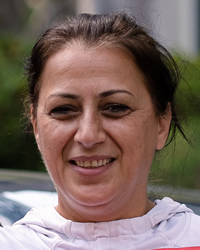Lishans trace their long heritage back to the Babylonian exile of the Judean people by King Nebuchadrezzar in 586. Like other Jews in Israel, the Lishan went from Israel to Babylon, a region located today in southern Iraq around Baghdad. Eventually many of them settled in Urmia which currently is the largest city in West Azerbaijan Province of Iran. Some lived in small communities located in the mountainous regions of Persian (Iran) and Turkey. Like other Jewish groups, they retain their identity through their own Aramaic dialect which they named "Lishan Didan" meaning "our language." Like the Kurds, they did not identify with a nationality. To the present time they still maintain they are Nash Didan (Lishan) Jews and not Persian or Turkish Jews. They lived in their communities until WWI when persecution began to force them to emigrate. Today the majority live in Israel. Most Lishan now live in the cities of Jerusalem and Tel-Aviv where they speak Hebrew.
Their language and traditions are dying out with the current generation. However, there are a number of Lishans attempting to maintain their Lishan culture through cooking traditional foods and telling the stories of their ancestors. Some are working to preserve their language. Music, dancing and singing in their Lishan dialect has helped them keep their heritage.
They have their own unique cuisine. Two popular dishes they make are Chatachtuma (Spaghetti with yogurt and garlic) and Khinkali (Dumplings). Some still carry out an old custom regarding the death of a family member. They prepare halva (meaning sweetness) a traditional Middle Eastern fudge-like candy. They maintained that the smell was so wonderful from the making of the halva that it provided a safe ascent for the soul of the decease to enter the Garden of Eden in heaven. An ancient but fun tradition is when a man throws an apple to a woman he wants to marry. If she catches the apple, she is accepting his marriage proposal. The Lishans value providing good education for their children and remaining close to their families and community.
Their Jewish roots were firmly established among the older Lishan generation. In Azerbaijan most Lishans followed God's guidance as provided in their Tanask (Hebrew Old Testament) and worshiped him in their synagogues. They built and maintained Jewish schools for their children. Today most Israeli Lishan Jews are not spiritually strong, and few maintain the ongoing instructions from God as found in the Tanask.
The greatest need of the Lishan is to return to reading and understanding of God's word with an open mind to accepting his prophecies that were fulfilled in Jesus. In this they will receive the hope and power of a life lived for God's glory and reflect the light of God to the nations.
Pray that Christ followers in Israel, including Messianic Believers, will be strong in faith and show the saving power of God's grace to the Lishan Jewish people.
Pray that the Lishan Jewish people will open their minds and hearts to hearing, accepting and living according to God's word.
Pray that the revelation of knowing the grace of Jesus will bring great joy of revelation to the Lishan Jewish people.
Pray for Lishan disciples to make more disciples who will make even more disciples of Christ.
Scripture Prayers for the Jewish, Lishanan in Israel.
| Profile Source: Joshua Project |










